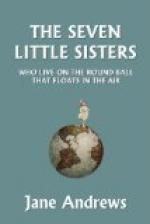When I was a child it was a very rare thing to see people such as these in our own land, but now we are quite familiar with these odd ways of dressing, and our streets have many of these funny names on their signs.
Shall we look in to see them at breakfast? Tea for the children as well as for the father and mother. They have no milk, and do not like to drink water, so they take many cups of tea every day. And here, too, are their bowls of rice upon the table, but no spoons or forks with which to eat it. Pen-se, however, does not need spoon or fork; she takes two small, smooth sticks, and, lifting the bowl to her mouth, uses the sticks like a little shovel. You would spill the rice and soil your dress if you should try to do so, but these children know no other way, and they have learned to do it quite carefully.
The sticks are called chopsticks; and up in the great house on the hill, where Pen-se went to carry fish, lives a little lady who has beautiful pearl chopsticks, and wears roses in her hair. Pen-se often thinks of her, and wishes she might go again to carry the fish, and see some of the beautiful things in that garden with the high walls. Perhaps you have in your own house, or in your schoolroom, pictures of some of the pretty things that may have been there,—little children and ladies dressed in flowery gowns, with fans in their hands; tea-tables and pretty dishes, and a great many lovely flowers and beautiful birds.
But now she must not stop to think. Breakfast is over, and the father must go on shore to his work,—carrying tea-boxes to the store of a great merchant. Lin, too, goes to his work, of which I will by and by tell you; and even Pen-se and her little sister, young as they are, must go with their mother, who has a tanka-boat in which she carries fresh fruit and vegetables, to the big ships which are lying off shore. The two little girls can help at the oars, while the mother steers to guide the boat.
I wish I could tell you how pleasant it is out on the river this bright morning. A hundred boats are moving; the ducks and geese have all gone up the stream; the people who live in the boats have breakfasted, and the fishermen have come out to their work. This is Lin’s work. He works with his uncle Chow, and already his blue trousers are stripped above his knees, and he stands on the wet fishing-raft watching some brown birds. Suddenly one of them plunges into the water and brings up a fish in its yellow bill. Lin takes it out and sends the bird for another; and such industrious fishermen are the brown cormorants that they keep Lin and his uncle busy all the morning, until the two large baskets are filled with fish, and then the cormorants may catch for themselves. Lin brings his bamboo pole, rests it across his shoulders, hangs one basket on each end, and goes up into the town to sell his fish. Here it was that Pen-se went on that happy day when she saw the little lady in the house on the hill, and she has not forgotten the wonders of that day in the streets.




